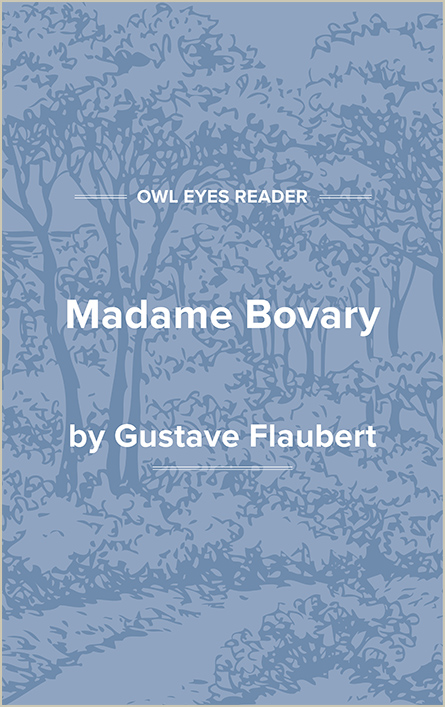Study Guide
Analysis Pages
Gustave Flaubert Biography
Gustave Flaubert (floh-behr), French novelist, was born in Rouen on December 12, 1821. His father was a doctor and director of the Rouen city hospital, his mother a retiring woman of bourgeois background. High-strung and imaginative, Gustave eagerly consumed all the fanciful stories that he could induce his nurse or his neighbors to tell him. As a student he joined in the anticlassical revolt that was sweeping France. Solitary by nature and not of a happy temperament, Flaubert became absorbed with literature and history and early became aware of his vocation as a writer.
During a summer vacation in 1836 he became emotionally attached to Elisa Schlésinger. He also soon found a companion and confidant in Alfred Le Poittevin, with whom he had a deep and lasting friendship. Flaubert’s mood throughout his youth was in keeping with the fashionable romantic temper, one of ennui and lassitude, partly genuine, partly affected. He suffered from fits of depression throughout his life.
In 1839 Flaubert traveled to Corsica, stopping in southern France for sightseeing and amorous adventures. After his return he wrote November, a romantic tale of love and longing. In the autumn of 1842 he became a law student in Paris, where he renewed acquaintance with Schlésinger (who refused to become his mistress). In January, 1844, he suffered a serious nervous attack and spent a year recuperating. He abandoned the idea of a law career and devoted his energies to literature.
Upon the death of his father in 1846, Flaubert inherited a comfortable annuity and pursued his literary career with fervor. In July he met the poet Louise Colet, with whom he had a stormy liaison. In the spring of the following year he took an extended trip through Brittany, which he described in Over Strand and Field, a work that first shows Flaubert’s almost paralyzing capacity for self-criticism and his determination to avoid self-revelation.
Glad to see the July monarchy overthrown, Flaubert participated in a minor way in the revolution of February, 1848. He then completed The Temptation of Saint Anthony, which he had begun in 1846, but his friends Louis Bouilhet and Maxime du Camp urged him to discard the manuscript in favor of subjects with which his rhetorical bent would have less scope. In the opinion of many critics, The Temptation of Saint Anthony, though not a superior book, more purely reflects Flaubert’s temperament than his later, more successful works.
With du Camp, Flaubert set out in October, 1849, on a journey of more than eighteen months to Egypt, Syria, Palestine, Greece, and Italy, a journey involving much sightseeing and some lovemaking. In the course of his travels he deepened his understanding of humanity, which he detested no less than before. In the autumn, 1851, he began work on Madame Bovary, which was to absorb him until its completion in April, 1856. His extreme pains with the style of Madame Bovary were rewarded when, upon publication, the book was acclaimed. (The broad success of the novel was also attributable to a widely publicized morals suit against the author.) Madame Bovary , a study of the effects of romantic notions on a sensitive woman, ranks as one of the great novels of European literature. In it Flaubert was undoubtedly effecting a self-cure, for Emma Bovary embodies a number of character traits and yearnings of the author. The book has usually been considered a masterpiece of realism, but stylistically Flaubert had little in common with his realist contemporaries, who had no time for his type of quest for beauty. As for realism in the sense of a dispassionate examination of reality, Flaubert carried the doctrine to its farthest limits, avoiding judgments and stoutly maintaining that the artist’s function is to understand humanity, not to explain or reform it. His approach has been characterized as objective, scientific, and deterministic. His observation and his efforts to express reality through the perfect word and phrase were tireless and...
(The entire page is 986 words.)
Owl Eyes subscribers get unlimited access to our expert annotations, analyses, and study guides on your favorite texts. Master the classics for less than $5/month!

